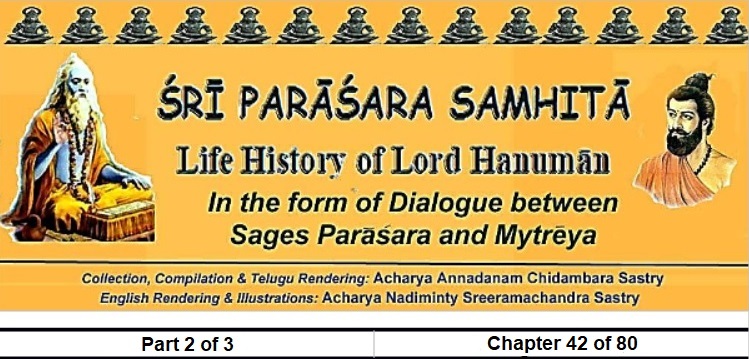
42nd Chapter (Dwichatvārimśat Paţalah)
“Narration of the Impact of the Veera Hanumān Malā Mantra”
(Veera Hanumān Mantra Prabhāva Kathanamm)
श्रीमैत्रय:
पराशर! महाप्राज्ञ! सर्वमन्त्रविशारद!
वद त्वं वीरहनुमन्मालामन्त्रंविशरद।। 1
Mytrēya:
“Oh! Omniscient One! The one who kows all the Mantras! Seer Parāśrā! Please tell me about the SrīHanumānMalāManttra (Chain Mantra of Hanumān).” (1)
श्रीपराशरः।
ज्ञाने विरागे हरिभक्तिभावे
धष्तिस्थितिप्राणबलेषु योगे
बुद्धौ च नान्यः हनुमत्समानः
पुमान्कदाचित्क्व च कष्चनैव।। 2
Parāśarā:
“Oh! Sage Mytrēya! There was none ever that is equivalent to Hanumān in knowledge (gńyāna), in detachment (vairagya), devotion, courage, firmness, longevity (of life), strength, tranquil mindedness for Spiritual Realisaton (cittavŗuttinirōdha) and scholarliness. (2)
शैवानां परमष्षैवो वैष्णवानां प्रधानतः
इति मत्वा हनूमन्तं मुनयस्समुपश्रिताः।। 3
Considered as Śiva by Śiavaites (Śiva followers) and as Vişņu by Vişņavas (Vişņu followers), Hamnumān is the protector of all sages. (3)
मन्त्रोद्धारं प्रवक्ष्यामि मन्त्रमाहात्म्यमेव च
मैत्रेय मुनिशार्दूल शष्णुष्वानन्यमानसः।। 4
Best amongst the sages! Sage Mytrēya! I am telling about the genesis of Hamnumānmālāmantra and its greatness. Listen with full attention. (4)
आदौ प्रणवमुच्चार्य नमो भगवते पदं
वीरप्रतापविजयहनुमत्पदमुच्यते।। 5
Formation of the Mantra
First utter the cosmic soun ‘Ōm’, then ‘Namōbhagavatē’ and then ‘VeeraPratāpaVijayaHanumatē’. (5)
स्तंभिनीमोहिनीवशीकरणपदमुच्चरेत्
ततो विद्वेषणी चैव मारणीपदमुच्चरेत्।। 6
Then say the words ‘sthambhinee’ ‘mōhinee’vaśeekaraņee’, followed by the words ‘vidwēşiņee’ and ‘maariņee’. (6)
ततष्च पव्म्चीकरणी तथा नामपदं वदेत्
ततो वै बन्धनबलामुखबन्धन चा प्यथ।। 7
Then utter the word ‘pańcakaraņee’ then the word ‘nāma’ then ‘bandhanabala’, then ‘mukhabandhana.’ (7)
ततः ग्रामुअमुखपदं बंधनेति पदं ततः
नारीमुखपदं चैव बन्धनेतिपदंततः।। 8
Then say ‘grāmamukhabandhana’, then ‘nātīmukha’, followed by ‘bandhana’. (8)
मकरचैषष्टिपदं बन्धनेति समुच्चरेत्
सिंहव्याघ्रवराहेति ततो वै सर्पवृश्चिकौ।। 9
After uttering the word ‘makaracauşţhi’ then say ‘bandhana’. After saying the words ‘simhavyāghravarāha’, say ‘sarpavŗşcika’. (9)
भूतचैराग्निबाधा च पाषाणपदमुच्चरेत्
निर्घातपदमुच्चार्य सर्ववैरिमुखं तथा।। 10
Then after saying ‘bhootacōrāgnibādhā’, say ‘pāşaņa’. Then, after saying ‘nirghāta, say ‘sarvavairimukham’. (10)
बन्धनेति तदुच्चार्य कुव्म्जरेति पदं वदेत्
ततो वष्षभमहिषभल्लूकमुखबन्धनम्।। 11
Then first saying the word ‘bandhana’, ‘kunjara’ word has to be uttered. Then to be said is the word ‘vŗşabhamahişabhallookamukhabandhana.’ (11)
चापरे वीरशब्दहनुमत्पदमुच्चरेत्
अथेश्वरस्वरूपेति तथा वै वायुनन्दनः।। 12
Then utter the words ‘veera’ and ‘hanumat’. Then utter the word ‘Ēśwararoopa’ and then the word ‘Vaayunandana’. (12)
अथाव्म्जनासुतेत्युक्त्वा पातु पातु पदं वदेत्
बान्धवविक्रमपदं श्रीवर्णं च समुच्चरेत्।। 13
Then, after saying the word ‘Ańjanāsuta’, say ‘pātupātu.’ Then saying the word ‘bāndhavavikrama’, then the word ‘śŗee’ has to be uttered. (13)
रामदूतपदं चैव शत्रुविध्वंसनपदं
ततो महाभैरवेति ततः शत्रुक्षयाय च।। 14
Then, after saying the word ‘Rāmadoota’, say ‘śatruvidhvamsana.’ Then saying the word ‘Mahābhairava’, then the word ‘śatŗukşayāya’ has to be said. (14)
प्रणवं च तदुच्चार्य ह्ना ह्नीं ह्रूं एहि एहि च
ततो वै सर्वविषये सर्वजनपदं ततः।। 15
Then, after saying the ‘Ōm’, say ‘hrām, hreem, hrōmēhiēhiēhi’ then say ‘sarvavişayēsarvajana’. (15)
वशीकरणेति पदं पष्चात्परबलं ततः
खादयेति द्विरुच्चार्य पश्चात् ममपदं ततः।। 16
After saying the word ‘vaīkaraņa’, then the word ‘parabalam’and then having said twice ‘khādayakhādaya’, say ‘mama’. (16)
सर्वकार्याणि पदं चोक्त्वा साधयेति द्विरुच्चरेत्
मम शत्रुक्षयं चैव कुरु कुर्विति संवदेत्।। 17
After saying the word ‘sarvakārtāņi’, then the words ‘sādhayasādhaya’ twice, Then having said ‘mama śatrukşayam’, say ‘kurukuru’. (17)
प्रणवं च तदुच्चार्य ह्नां ह्नीं ह्रूं पदमुच्चरेत्
वराहबीजमुच्चार्य फट् स्वाहा च पदं वदेत्।। 18
Afterwards saying ‘Ōm’ then say words ‘hrām,hreem,hrōmi’. Then the varāhabeeja (First Boar seed) word ‘hum’. After that ‘phatswāhā’ has to be said. (18)
वर्णानां च षट्पव्म्चाशदुत्तरषतद्वयं
सर्वमन्त्रेष्वयं मन्त्रश्रेष्ठ इत्युच्यते बुधैः।। 19
This mantra comprises of 250 letters. Wise scholars say that it is the best among all mantras. The letters to be uttered in this mantra have to be learnt from a teacher (giru). (19)
मन्त्रस्यास्य पुरष्चर्या होमस्तपर्णमेव च
प्रतापहनुमन्मालामंत्रवद्वक्ष्यते मुने! 20
The repetitive procedures (puraścaryāvidhāna), fire sacrifice procedure (hōmavidhāna), ablution methodology (tarpaņavidhāna) are told to be like for the PratāpaHanumanmālā mantra. (20)
ध्यानम्
उद्यन्मार्ताण्डकोटिप्रकटरुचिकरं चारुवीरासनस्थं
बिभ्राणं हेममौंजीं करधष्तकमलं नागयज्ञोपवीतं
धीरं सर्पेंदुमौलिं वरमणिमुकुटं कुण्डलाभासगण्डं
भीमाकारं त्रिनेत्रं मम शुभफलदं वायुपुत्रं नमामि।। 21
Dhyānam(Meditation)
‘The One with the radiance of a ten million rising Suns, the One sitting beautifully in the veerāsana (great warrior) posture, One wearing golden waist band made from Asiatic grass (Saccharummunja), holding a serpant in hand, wearing a sacred thread (yagńyōpaveet) formed with a snake, the firm One, wearing a snake and Moon on the head, One wearing a golden crown studded with best precious stones, One with cheeks shining due to the radiance of ear ornaments worn, One with a ferocious form, One with three eyes, the One who bestows auspicious on me; to such a Son of Wind God, I bow.’ (21)
ऋषिर्मनोरीष्वरष्च त्रिष्टुप्छन्दः प्रकीर्ततम्
कालाग्निरुद्रश्रीमान् हनुमान् देवता भवेत्।। 22
Ēśwara (Śiva) is the sage for this mantra, trişţupis said to be the metere (chandas). ŚreeHanumān, equal to the ferocious form of Śiva at the all-consuming Destruction Time (kālāgni Rudra) is the God. (22)
प्रणवं बीजमित्युक्तं स्वाहा शक्तिः प्रवक्ष्यते
हनुमान् कीलकं चैव मम सर्वाभीष्टसिद्धये
जपे पदं समुच्चार्य विनियोगस्ततः परम्।। 23
‘Ōm’ is the seed, ‘swāhā’ is the power, ‘Hanumān’ is the key. Then one has to announce that ‘mama sarvābheeşţasiddhyardhē’ (= for fulfillment of all my wishes). (23)
क्रमशो मूलमन्त्रेण षडङ्गन्यासमाचरेत्
अत्रैव चोदाहरणमितिहासं पुरातनम्।। 24
One has to perform six-body-part-postures (şadańga nyāsa) sequentially reciting the base (moola) mantra. There is an ancient history as an example of this. (24)
यशस्स्यं स्वर्गदं नष्णामपवर्गफलप्रदम्
यस्य श्रवणमात्रेण सद्यस्सुखमवाप्नुयात्।। 25
History of the Mantra
That (history) can bestow fame, heaven and salvation to people. People will be happy even on listening to that history. (25)
युधि रामो दशग्रीवं हत्वा नन्तबलान्वितम्
जानकीसहितष्श्रीमान् सुग्रीवादिप्लवङ्गमैः।। 26
After killing Rāvaņa in the war, ŚreeRāma, the one with limitless power, along with Jānaki, Sugreeva and other monkey warriors, (26)
विभीषणादिदनुजैः सुरब्रह्मर्षिभिस्सह
पुष्पकं तत्समारुह्य नभोमार्गेण सत्वरम्।। 27
Along with Vibheeşaņa and other monkey warriors,also with divines and Creator equal sages (surabrahmarşibhissaha), travelling fast along the skys in the puşpaka aircraft, (27)
अयोध्यानगरं प्राप्य सुचिरं सुमहोदयः
कदाचिद्राघवो दष्ष्ट्वा हनुमंतं महाबलम्
प्रतापशलिनं वीरं कपिवर्यमुवाच ह।। 28
Reaching the Ayōdhya city, once the greatest of great Raghurāma, said so to the mightily powerful, courageous, great warrior and best among the monkey warriors Hanumān. (28)
हनुमन् बुद्धिसम्पन्न महाबलपराक्रम
भवदीयोपकाराणां हृदये परिधावताम्।। 29
‘Hanumān! Possessor of vast intelligence! Possessor of great strength and courage! My heart is full of the good deeds done by you for me. (29)
दुष्कराणां विरिव्म्चाद्यैः मादशानां तु किं पुनः
किंवा प्रत्युपकारं ते करिष्याम्यधुना सखे! 30
Difficult even for Creator Brahma and other greats, what to tell of ordinary ones like me? Oh! Good friend (sakhā)! I, myself will do a good turn to you in reply to those. (30)
प्रथमं दुर्गमे रम्ये सीताविरहकातरः
इतिकर्तव्यतामूढ़ः सीताध्यानपरायणः
अहं ममानुजष्चैव भवता प्रापितौ धष्तिम्।। 31
When I was frightened initially on abduction of Sītā from beautiful the deep forest where no human being treads, unable to do anything and thinking of Sītā alone, myself and my brother Lakşmaņa got courage from you. (31)
ततस्सुग्रीवसाचर्यं वाङ्मनस्तुल्यचेष्टितम्
त्वयैवावहितो नूनं सिन्धुमध्ये प्लवो यथा।। 32
Then you were instrumental in providing, by word and by heart an equal friendship with Sugreeva that was like a boat for those amidst the ocean. (32)
ततस्सीतां मष्गयता भवताकारि यत्सखे!
दुर्वचं तन्ममाद्यापि कर्तुं वा कथमीष्वरः।। 33
Dear companion! Then I cannot describe the deeds that were done by you while searching for Sītā. How is it possible to be done? (33)
मत्सन्देशहरेणैव सीता संलालिता त्वया
सीता पि विगतप्राणा पुनरुज्जीविता त्वया।। 34
Sītā was consoled and her mood uplifted, when you took my message to her. Sītā, who was just somehow existing, was like are born, thanks to you. (34)
बहुनात्र किमुक्तेन लक्ष्मणः प्राणसन्निभः
पुनरुज्जीवितस्तेन तत्प्रत्युपकृतिः र्वदेत्।। 35
Why tell a lot about this issue? Even Lakşmaņa, dear to me like my own life was brought back to life by you. Who can tell which could be the best return-service for that? (35)
एकैकस्योपकारस्य प्रतिकर्तुमनीश्वराः
ससोदार्यासहामात्यास्सकलत्रास्सबान्धवाः
अन्ये मद्वंशजा नूनमृष्णिका वायुनन्दन! 36
Oh! Son of Wind God! My whole family, capable of doing return good turn to you, comprising of brothers, ministers, wives, and relatives, in fact every one born in our clan, is indebted to you. (36)
तथापि प्रार्थयाम्यद्य करिष्ये भवदीप्सितम्
तन्ममाचक्ष्व भद्रं ते शष्णु मत्प्रार्थनां कपे! 37
Even so, I decided to do whatever you dearly desire. I plead you to tell me whatever is that you wish. Listen to my pleading. (37)
इत्युक्तो रामचन्द्रेण वायुपुत्रो महाबलः
विनयावनतो भूत्वा बभाषे रघुनन्दनम्।। 38
So told by Rāma, the mightily powerful son of Wind God, bowing in reverence, said so to Raghurāma. (38)
भवत्पादाब्जयुग्मे स्मिन् भक्तिरस्त्वनपायिनी
सर्वेषां श्रेयसां मूलं ब्रह्माद्यैरपि दुर्लभा
यद्यस्ति ते कृपा स्वामिन् वरमेष वरो मम।। 39
‘Oh! Lord! Suffice if my devotion to your two lotus feet stands undeterred, That is the root for all splendidness. That will be the best boon to me, that even Creator Brahma and others can not get.’ (39)
इत्याकण्र्य वचस्तस्य प्रहसन्नघुनन्दनः
अप्येवं भवतः कामः शाश्वतः पवनात्मजः
किंतु मत्प्रार्थनां श्रुत्वा गष्हाणेमं वरं पुनः।। 40
Hearing Hanumān’s such words, smiling, Rāma said so. ‘Oh! Son of Wind God! Even if that is your eternal wish, considering my pleading reconsider accepting this boon. (40)
भवतः पूजनार्थाय प्रतिमारूपधारिणः।।
हनुमत्पुरनामानं ग्राममाचन्द्रतारकम्
गृष्हाण मदनुज्ञातः प्रतिष्ठासिद्धये तव।। 41
Hanumatpura Village
Accept, as my command, your worship in the form of an idol in a village named Hanmatpura that remains famous as long as the Moon and stars remain. (41)
तत्र ग्रामे द्विजश्रेष्ठाः श्रोत्रियाः सोमयाजिनः
सर्वशास्त्रेषु कुशलाः नित्यकर्मपरायणाः।। 42
In that village, best amongst the Brāhmin that are Vēdic scholars, performers Fire Sacrifices, learned in all sciences (śāstrās), performing routine rituals (nityakarma) (42)
स्वाचारनिरता नित्यं भवन्मंत्रपरायणाः
भवन्तं पूजयिष्यंतः त्वामेव शरणागताः।। 43
Sticking to their clan’s traditions, reciting your name only, worshipping you only, beseeching you as their protector, (43)
भक्त्वा त्वव्यभिचारिण्या त्वय्यावेशितचेतनः 44
Taking the devotional path as the goal and keep you in their inner conciousness.’ (44)
इति वादिनि राजेन्द्रे कौसल्यानन्दवर्धने
सुवर्चलापतिः प्राह तत्कालसदृशं वचः।। 45
When Śreerāmacandra, the delight of mother Kausalya, talked in that manner, Hanumān, the Lord of Suvarcchala, said as follows; appropriate to the occasion. (45)
भगवन् देवदेवेश! पुराणपुरुषोत्तम!
भष्त्यभावेन मे संस्था भवद्विग्रहसन्निधौ
अन्यथा मम न प्रीतिः इति स्नेहादभाषत।। 46
‘Oh! Śreeramacandra! Almighty! God of Gods! Best amongst men! I wish only to remain a servant at the feet of your idol. I will not be content with any other thing.’ Having said so, out of His reverence (to the Lord) (46)
हनुमान् प्रतिजग्राह ग्रामं विप्रजनाश्रयम्
हेमप्राकारसहितं कलधौतगष्होज्जवलम्।। 47
Hanumān accepted that village, abode of Brāhmin people. That village is radiant with golden and silver houses surrounded by golden perimeters. (47)
चन्द्रमण्डलपर्यन्तव्याप्तप्राकारशोभितम्
नानामाणिक्यखचितं गोपुरैरप्यलंकृतम्। 48
(That village) is resplendent with enclosures that spread up to the Moon. Embellished with town gate towers embedded with various precious stones; (48)
अश्वैर्भद्रगजैर्गोभिः स्यंदनैः परिपूरितं
नानागणित वीधीषु – भूसुरैरग्निहोत्रिभिः।।
वेदशास्त्रपुराणौघपोषैष्च परिशोभितम् || 49
Full of excellent horses, elephants, cows and chariots; its numerous streets are radiant with Brāhmin people keeping lit the permanent sacrificial fires and sustaining Vedas, śāstrās, purāņās and others; (49)
हंसकारण्डवाकीर्णैः कुमुदोत्पलपङ्कजैः
अलंकष्तैस्तटाकैश्च दी£घकाभिविराजितम् || 50
Beautiful with large tanks and step-in wells with swans, water fowls and others birds, white lotuses, lotuses of different colours; (50)
ब्रह्मक्षत्रियवैश्यादिनानावर्णैः प्रपूरितम्।। 51
Full of Brahmin, kşatriya (warrior class), vaiśya (trading class), and of all other castes and clans; (51)
खर्जूरनारिकेलादिपूगीकदलिकादिभिः
तिंत्रिणीचूतपनसजम्बीरहरिचन्दनैः।। 52
With palm trees like dates, coconut, arica-nut, banana and trees like tamarind, mango, jackfruit, lemon, sandal and others; (52)
कपित्थबिल्वामलकैः वनैरन्यैष्च शोभितम् 53
Well-endowed with wood-apple (kapittha), bael / bel / golden-apple trees (bilwa), gooseberry groves and trees of many other types; (53)
केतकीमल्लिकाजातिपुन्नागैश्चपकैशुभैः
वकुलादिभिरन्यैश्च कुसुमैस्सुमनोहरैः
रम्यं समष्द्धिसंयुक्तं एवंविधमनुत्तमम्।। 54
Splendorous and auspicious with plenty of beautiful flower varieties like screw-pine (kētakī), jasmine (mallikā), Spanish jasmine (jāji), a type oflaurel (punnāga), champak (śampaka), pagoda (śuka) and many other pleasing flowers; (54)
मेरोर्दक्षिणदिग्भागे दशयोजनविस्तष्तम्
आयतं च तथा चैव घनग्रामं तथा ततः।। 55
And spread across 13 kilometers is that village, in the southern side of Mount Mēru. (55)
हनुमानपि तं ग्रामं नाम्ना च हनुमत्पुरम्
कृष्त्वा बहुभ्यो विप्रेभ्यः ददौ आचन्द्रतारकम्।। 56
Naming at the Hanumatpura, Hanumān donated it to some Brāhmin people with to enjoy property rights for ever. (56)
तस्मिन्पुरे विप्रमुख्याः परिपूर्णमनोरथाः
देवालयान्हनुमतस्सहग्राणि चतुर्दश।। 57
With heartful devotion, the good Brahmins of the village, in it, 14,000 Hanumān temples (57)
कारयित्वा महाभागहनुमद्धक्तिसंयुताः
चतुर्भुजान् दशभुजान् वीररूपांस्तथैव च।। 58
Were got constructed, with total Hanumān devotion, saw to it that the (various) Hanumān idols are in different forms – four-shouldered, ten-shouldered, in warrior (veera) form; (58)
भीमाकारान्पव्म्चमुखान् उष्ट्रारूढान्महौजसः
ततो मुकुलितकरान् शान्तरूपांस्ततःपरम्।। 59
In frightening hero form (bheekāra), five-faced (pańcamukha) form, form of the rider of the greatcamel (uşţrāroodhā), mighty luminous form (mahoujasah), folded-handed form (mukulitakara), also in the peaceful countenance form (śāntaswaroopa); (59)
तथा सुवर्चलोपेतान् उग्ररूपान् महात्मनः
एवं विधान्विग्रहांष्च कारयित्वा हनूमतः।। 60
Form along with consort Suvarcchala (Suvarcchalōpēta), in ferocious form (ugraroopa) and Hanumān idols of several other forms were got made; (60)
तेष्वालयेषु संस्थाप्य नित्यं सेवापरायणाः
महोत्सवरताश्चैव तस्थुस्स्वर्गे मरा इव।। 61
Having got ritualistically established (the various idols) in those 14,000 Hanumān temples, the residents were busy in performing routine worship, performing great festivals as the occasions demanded, they were living in that village like gods in the heaven. (61)
कदाचित्कालयवननन्दनः सुरकण्टकः
पापिष्ठो दुर्मुखोनाम महाबलपराक्रमः।। 62
Durmukha – the Evil Demon
Once, son of demon Kālayama, dangerous to celestial beings (dēvatā), evil-doer, mightily powerful and courageous, one named Durmukha, (62)
चतुरङ्गबलोपेतः मदान्धश्च भयङ्करः
विप्राणां धनधान्यानि हनुमत्पुरवासिनाम्
हरिष्यामीति दुर्बुद्ध्या तत्पुरं दुर्मुखो ययौ।। 63
(Durmukha), frightening and intoxicated with power, reached the Hanumatpura village with the evil intension of robbing the wealth and food grains of the Brāhmin people. (63)
पुरस्य निकटं प्राप्य यवनो दुर्मुखस्तथा
पुरस्तान्विप्रमुख्यांष्च समाहूयैवमब्रवीत्।। 64
Reaching close to the village that evil-doer Durmukha beckoned the elders of those Brāhmins and told them so. (64)
भो!भूसुरा! युष्मदीयं चिरकालार्जितं धनम्
सर्वं दत्वाद्य मे यूयं पुरं त्यक्त्वा बहूर्जितम्।। 65
‘Oh! Brahmins! Give me all the wealth that you acquired since long, leave this great village, (65)
सकलत्रास्सपुत्राश्च् गच्छध्वं च सबान्धवाः।। 66
Along with your wives, sons and relatives forever.’ (66)
इत्येवं दुर्मुखवचः श्रुत्वा सर्वे महाद्विजाः
निर्भया धैर्यसम्पन्नास्तुमूचुर्दुर्मुखं प्रति।। 67
Hearing these words of Durmukha, those Brāhmins, without fear and in a courageous manner said so to Durmukha. (67)
त्रेतायुगे हनुमता वीरेण पुरमुत्तमम्
अस्मभ्यमूर्जित्ं दत्तं स्थानत्यागः तु नोचितः।। 68
‘This village was gifted to us firmly by valorous Hanumān in Trētāyuga (2nd Hindu Time Cycle). We cannot leave this place. (68)
सर्वथा यदि त्याज्यो ग्रामो यं चिरसंश्रितः
तर्हि दाता हनुमान्नो यच्चास्मत्कुलदैवतम्।। 69
This village cannot be left (by us) in this manner. This village is our abode since a long time. Not only that; it was gifted to us by Hanumān, the lord of our clan. (69)
किं नु निष्कासयेदस्मांस्वयमेवाश्रितान् प्रभुः
तदा यामो वयं त्यक्त्वा ग्राममद्यैव दुर्मुख।। 70
Will our benefactor Hanumān get us out this place? If He himself tells us so, we will leave right away.’ (70)
इत्युक्त्वा यवनसुतं द्विजातिसङ्घा
निर्भीका हनुमदनुग्रहप्रभावात्
पादाब्जे कुलदैवतस्य संतो
हृत्पद्मेषु विभावयांबभूवुः।। 71
That group of Brāhmins could tell so fearlessly to Durmukha, the son of Yavana, thanks to the benevolence of Lord Hanumān. Having told so, they started meditating with the lotus feet of Lord Hanumān in their hearts.” (71)
इतिश्रीपराषरसंहितायां श्रीपराषरमैत्रेयसंवादे श्री वीरहनुमन्मालामन्त्रप्रभावकथनंनाम द्विचत्वारिंषत्पटलः
Thus ends the 42nd Chapter entitled “Narration of the Impact of the Veera Hanumān Malā Manytra”
![]()

Click here to visit the Contents of the Part 2.
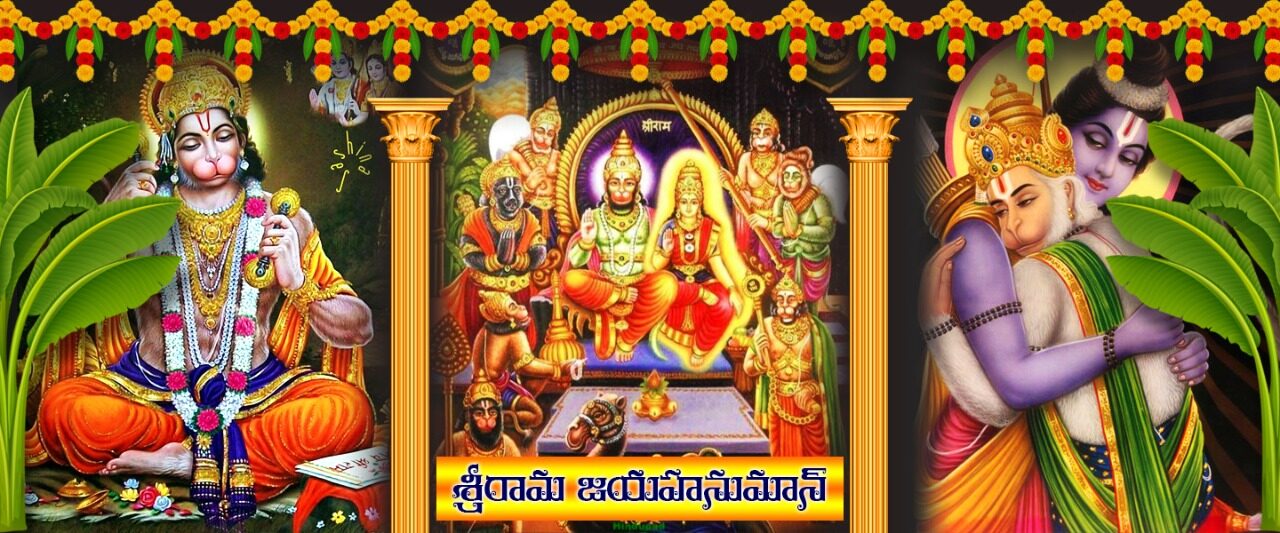


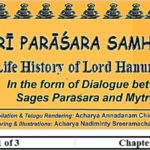

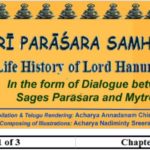
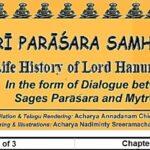
Be First to Comment